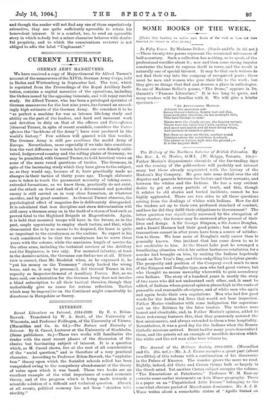GERMAN ARMY MANCEUVRES.
We have received a copy of Major-General Sir Alfred Turner's account of the manceuvres of the XIVth. German Army Corps, held in Baden and Wfirtemberg in September last. The text, which is reprinted from the Proceedings of the Royal Artillery Insti- tution, contains a capital narrative of the operations, including the Orders issued by the opposing Generals, and will repay careful study. Sir Alfred Turner, who has been a privileged spectator of German manceuvres for the last nine years, has formed an exceed- ingly high estimate of the German Army. He considers it to be "as perfect a machine for war as intense life-long study and ability on the part of the leaders, and hard and incessant work and devotion to duty on that of the officers and Unteroffiziers [General Turner, in spite of recent scandals, considers the Unter- offiziers the 'backbone of the Army'] have ever produced in the world's history." Few soldiers will quarrel with this verdict. The German Army is still par excellence the model Army of Europe. Nevertheless, more especially if we take into considera- tion the vast difference in terrain between our own densely culti- vated, hedgerowed country and the rolling plains of Germany, we may be permitted, with General Turner, to hold heretical views on some of the more vexed questions of tactics. The Germans, in spite of the increasing study which they have given to the subject, or, as they would say, because of it, have practically made no changes in their tactics of thirty years ago. Though elaborate care is taken to teach the paramount necessity of taking cover, extended formations, as we know them, practically do not exist, and the attack on front and flank of a determined and powerful enemy is still carried on in very close formation, at whatever sacrifice, and by great numbers. As General Turner observes, the psychological effect of magazine fire is deliberately disregarded. It is calculated that iron discipline and stern determination will still carry a German army on in the teeth of a storm of lead such as proved fatal to the Highland Brigade at Magersfontein. Again, it is held that mounted troops will have in the future, as in the past, ample opportunity to employ shock tactics, and that, while dismounted fire is by no means to be despised, the lance is quite as important to the cavalryman as the carbine. So expert is his work considered to be that the cavalryman has to serve three years with the colours, while the maximum length of service for the other arms, including the technical services of the Artillery and the Engineers, is two only. For mounted infantry, at least in the decisive action, the Germans can find no use at all. If their view is correct, then Mr. Brodrick when, as he expressed it, he "put his money on the Yeomanry" clearly backed the wrong horse, and so, it may be presumed, did General Turner in his capacity as Inspector-General of Auxiliary Forces. But, as we have said, our admiration for the German Army does not involve a blind subscription to all their tactical theories, though they undoubtedly give us cause for serious reflection. Tactics which may be imperative on the Continent might conceivably be disastrous in Hampshire or Surrey.
INTEREST.


































 Previous page
Previous page